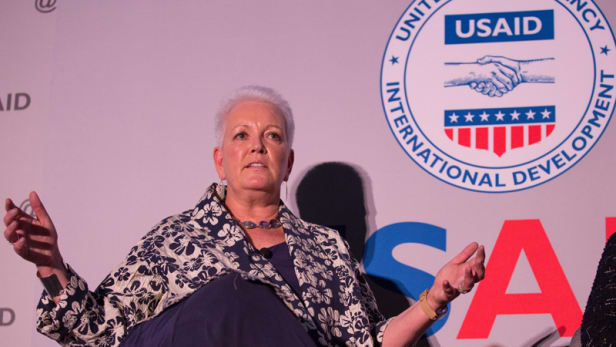By Michael Igoe
 |
| Gayle Smith, outgoing administrator of the U.S. Agency for International Development. Photo by: Ellie Van Houtte / USAID / CC BY-NC |
In a cabinet exit memo delivered to President Barack Obama on Thursday, outgoing U.S. Agency for International Development Administrator Gayle Smith pointed to eight years of progress but warned advancing U.S. global development efforts will require “hard work ahead”.
Smith, who will vacate her position when President-elect Donald Trump takes office on Jan. 20, listed six recommendations for “building the USAID the world needs.”
It remains to be seen who might take these recommendations on board. After an unusually long wait, Trump’s USAID transition effort is now underway, but the team, led by former Goldman Sachs Vice President Erin Walsh, has not given any indication of who it might tap to lead the agency. There has also not been any decision yet about who will serve as acting administrator in the intervening time between Smith’s departure and the eventual Trump nominee’s confirmation, according to a USAID official.
“There is no question that we have hard work ahead of us. As a country and as a global community, we have to answer volatility with stability, injustice with human rights, despair with opportunity, and conflict with peace,” Smith wrote.
Her first recommendation is for USAID to expand its network of constituencies and to work harder at public relations. The agency should, “expand its outreach to the American public to better communicate its results,” Smith wrote, and work to “counter the popular perception” that federal spending on foreign aid is much higher than it actually is. On average Americans estimate the foreign aid budget composes roughly 20 percent of the federal budget, when in fact it accounts for less than 1 percent.
The aid chief’s second recommendation was to “nurture and sustain” bipartisan support for global development. Her memo pointed to three pieces of legislation — the Global Food Security Act, the Electrify Africa Act, and the Foreign Aid Transparency and Accountability Act — which all garnered bipartisan support and, in doing so, helped secure Obama administration priorities.
Third, Smith described the need for a balance between short-term crisis response and long-term development priorities and to not allow the “urgent to crowd out the important.” Her memo alluded to “staffing and operating constraints” at the Bureau for Democracy, Conflict, and Humanitarian Assistance that should be overcome so the agency can respond to multiple, complex crises at the same time. She also urged a greater understanding within USAID and across branches of the government that “development takes time and that quick fixes rarely lead to lasting gains.”.
Fourth, Smith decried the “stop and start phenomenon that has plagued American development investments over time.” New ideas and initiatives can displace ongoing and important work that should be sustained in order to reach its potential. The aid chief nodded to the Obama administration’s willing “inheritance” of the President’s Emergency Plan for AIDS Reduction from George W. Bush, and she called for the same kind of sustained commitment to food security and energy investments in Africa.
The administrator advocated for investments in national government capacity among USAID’s partner countries, citing a shift toward diversified development finance and increased political leadership. “Investing in the capacity of these countries yields results that take time to materialize, but last longer,” Smith wrote.
Finally, the USAID administrator recommended that whoever steers the agency toward its future should do so with the internal mechanics, not just the outward-facing programs firmly in mind. More investment is needed in USAID’s “evaluation, analysis, and the discipline of development,” Smith wrote, and the next U.S. development leaders should sustain USAID’s “[human resources] transformation process.”

No comments:
Post a Comment